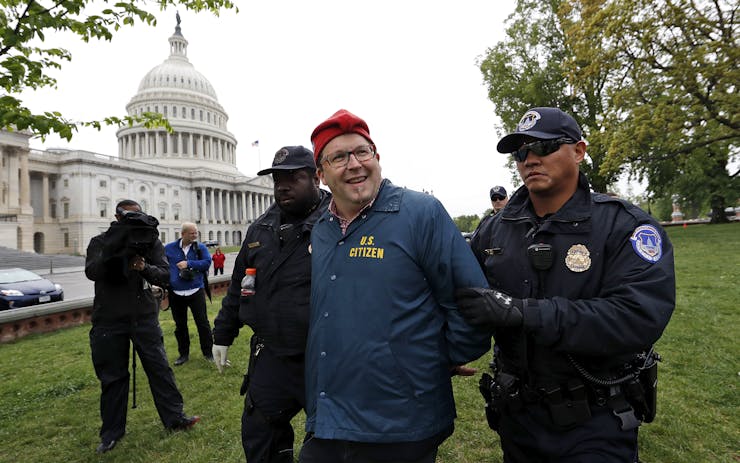Earlier this year, several DC cannabis advocates were arrested during a series of “smoke-in” protests at the US Capitol. This week, it was announced that the US Attorney’s office would be dropping charges against the leader of the protest.
DCMJ leader and vocal cannabis advocate Adam Eidinger first organized a movement to take place on April 20th, during which the group planned to give away 1,227 hand-rolled joints to Congressional staffers and members of Congress to spur support of House Resolution 1227, the Ending Federal Marijuana Prohibition Act of 2017.
Labeled the First Annual Joint Session, the event was abruptly shut down by Capitol police within minutes of arriving on the scene. Eight DCMJ advocates were arrested and were told they were facing federal drug charges, despite the fact that the group was careful to restrict their demonstration to grounds that fall under local jurisdiction.
Just days later on April 24, the group reorganized for a second round of protests, only to be met yet again with more arrests.
In both cases, the Capitol Police maintained that they were enforcing federal law and charged each activist with federal possession, which carries a penalty of up to a year in prison and a $1,000 fine.
It was later revealed that only two of the advocates arrested would be facing charges from the 4/20 protest, and the charges were eventually reduced to a violation of the DC Code for Public Consumption of Marijuana, an offense that usually does not require arrest and is instead punishable by a small civil fine.
Natalie De Leon, one of the activists who was arrested during both protests, described her experience as one of confusion and uncertainty from the moment of the 4/20 arrest onward.
“They held us at the Capitol Police, and seemed like they were taking their sweet time and were extremely unorganized,” she said of the first arrest. “They didn’t know who the arresting officers were and even confessed that they’ve been planning this arrest all week, and MPD [Maryland Police Department] wanted nothing to do with it.”
“Eventually we got moved to the DC central holding block and the conditions were shit. Adam’s cell was infested with cockroaches,” De Leon described. “I also learned about how messed up this justice system is. We were there for God knows how long. The women [arrested during the 4/20 protest] witnessed police brutality in the middle of the night.”
She and the other protesters were held for another six to eight hours, bringing their total time in custody to over 24 hours. And then, unceremoniously, “they just let me go. They were like, you’ve got no papers and you can go.”
Although eight members of the group were arrested and held overnight, only Eidinger and William Angolia of the DC Canna Co-op Club faced charges of possession of a controlled substance due to the weight of the joints in their possession. Eidinger was charged with possessing 2.06 ounces, and Angolia was charged with possessing 2.405 ounces, just above the legal threshold.
Shop highly rated dispensaries near you
Showing you dispensaries nearEidinger, who helped draft the legalization initiative in DC, had his charges dropped when the Drug Enforcement Agency determined that he was, in fact, carrying less than the legal limit due to the initial inclusion of the weight of the paper and cardboard crutches on the joints.
Charges against Angolia are still pending.
During the second protest, four activists were arrested, including De Leon. This time, however, the charges were more clearly outlined as a violation of the DC Code of Public Consumption, and the arrestees will be required to attend a court hearing later in the fall.





